
Skyler Ware
Skyler Ware is a freelance science journalist covering chemistry, biology, paleontology and Earth science. She was a 2023 AAAS Mass Media Science and Engineering Fellow at Science News. Her work has also appeared in Science News Explores, ZME Science and Chembites, among others. Skyler has a Ph.D. in chemistry from Caltech.
Latest articles by Skyler Ware

Stalagmites adhere to a single mathematical rule, scientists discover
By Skyler Ware published
Scientists discover all stalagmites growing from cave floors follow a mathematical rule that explains how these mineral formations develop into different shapes.
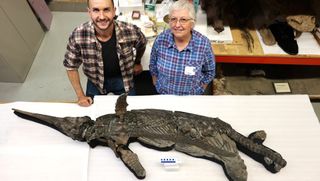
New species of Jurassic 'sword dragon' could help solve an evolutionary mystery
By Skyler Ware published
The newly discovered ichthyosaur dubbed Xiphodracon goldencapsis was about 10 feet long and had a sword-shaped snout.

Shackleton's infamous ship 'Endurance clearly had several structural deficiencies,' new analysis reveals
By Skyler Ware published
Ernest Shackleton's ship, the Endurance, infamously sank in Antarctica — and now a new study finds that it had known flaws.
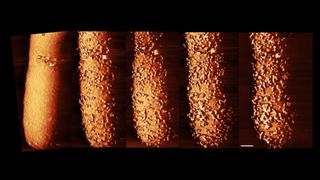
Striking images capture an antibiotic slaying bacteria in real time
By Skyler Ware published
Scientists have captured images of polymyxins, a type of antibiotic, disrupting and infiltrating the membranes of disease-causing bacteria.

Chinese tech company develops creepy ultra-lifelike robot face — watch it blink, twitch and nod
By Skyler Ware published
A Chinese robotics company has unveiled what it describes as a realistic robot face, with plans to make humanoid robots more approachable and relatable.
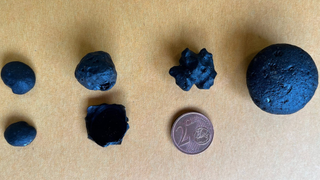
Weird glass in Australia appears to be from giant asteroid impact — but scientists 'yet to locate the crater'
By Skyler Ware published
Strange glass strewn across southern Australia appears to be from a mystery asteroid impact 11 million years ago.
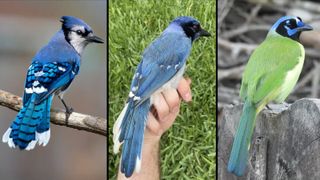
Rare blue-and-green hybrid jay spotted in Texas is offspring of birds whose lineages split 7 million years ago
By Skyler Ware published
The hybrid bird is the product of two species whose habitat ranges began to overlap a few decades ago, potentially due to climate change, researchers said.
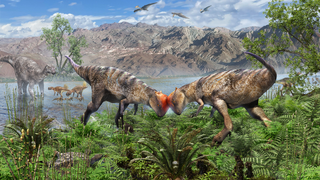
Oldest-known dome-headed dinosaur discovered sticking out of a cliff in Mongolia's Gobi Desert
By Skyler Ware published
The juvenile pachycephalosaurs, which predates the previous oldest dome-headed dinosaur by 15 million years, reveals more about how and when this unusual feature developed.

Scientists invent new sunscreen made from pollen
By Skyler Ware published
Traditional chemical sunscreens can damage coral reefs. Scientists say there's a fix using one derived from tea plant pollen.

1,900-year-old 'treasure' found in Roman-era family's scorched house in Romania
By Skyler Ware published
A discovery in Romania shows the remains of an elite family's treasures from the Roman era that were scorched in a fire.

Microsoft's new light-based computer is inspired by 80-year-old technology — it could make AI 100 times more efficient
By Skyler Ware published
Microsoft's latest computing system uses micro-LEDs and camera sensors to perform calculations.
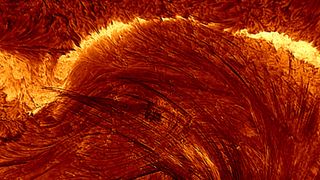
Scientists unveil most detailed photo of a solar flare ever taken
By Skyler Ware published
Record-breaking images from the world's largest solar telescope, the Daniel K. Inouye Solar Telescope in Hawaii, reveal a solar flare in unprecedented detail.

US reports its first New World parasitic screwworm infection in decades
By Skyler Ware published
A person in Maryland has been diagnosed with an infection of the flesh-eating New World screwworm. It's the first case in the U.S. in decades.

Keratin extracted from sheep's wool repairs teeth in breakthrough
By Skyler Ware published
Keratin extracted from sheep wool has been found to help protect human teeth. It could be coming to your dentist’s office soon.

New brain implant can decode a person's 'inner monologue'
By Skyler Ware published
A new brain-computer interface can decode a person's inner speech, which could help people with paralysis communicate.
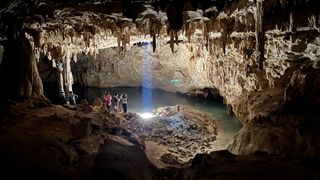
13-year drought crippled Maya on Yucatán Peninsula 1,000 years ago, study finds
By Skyler Ware published
An analysis of a stalagmite within a Mexican cave reveals detailed evidence of drought that contributed to the downfall of the Maya civilization in the area 1,000 years ago.

James Webb telescope spots earliest black hole in the known universe, looking 'as far back as you can practically go'
By Skyler Ware published
Astronomers using the James Webb telescope have zoomed in on a 'Little Red Dot' that existed just 500 million years after the Big Bang, and found that it may contain the earliest known black hole in the universe.
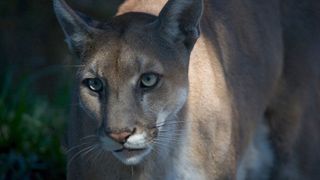
Texas puma genes rescue Florida panthers from extinction — for now
By Skyler Ware published
The low number of remaining Florida panthers has led to severe inbreeding. But now, genes from Texas pumas are helping to save them from extinction.
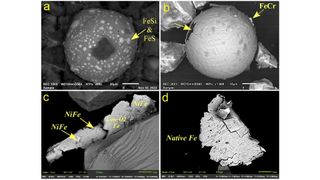
Massive comet trail may have transformed Earth's climate more than 12,000 years ago, tiny particles suggest
By Skyler Ware published
A massive comet trail may have caused climate upheaval on Earth more than 12,000 years ago, sparking the Younger Dryas.

Archaeologists discover 'Land of the White Jaguar,' centuries-old stronghold of rebel Maya in Mexico
By Skyler Ware published
Archaeologists in Mexico have finally discovered the 'Land of the White Jaguar,' a stronghold for Maya rebels for nearly 110 years in the 16th and 17th centuries.

NASA spacecraft snaps images of lunar transit and Earth eclipse on the same day — see the photos
By Skyler Ware published
The Solar Dynamics Observatory saw a lunar transit and an Earth eclipse on July 25 — the first when the moon passed between it and the sun, and another when Earth did the same.
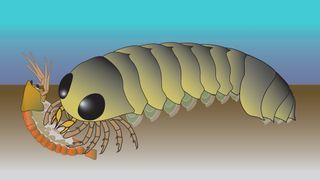
'Backward' brain of ancient sea creature hints spider ancestors evolved in the ocean
By Skyler Ware published
The tiny 'backward' brain of an ancient sea creature hints that spider ancestors might have gotten their start in the ocean.

Pristine Etruscan tomb discovered in Italy contains more than 100 untouched artifacts
By Skyler Ware published
Archaeologists in Italy have discovered a rare 2,600-year-old Etruscan tomb that somehow escaped looters over the centuries.
Get the world’s most fascinating discoveries delivered straight to your inbox.


